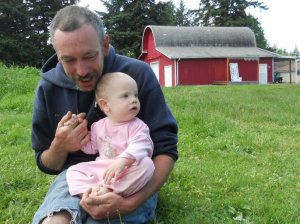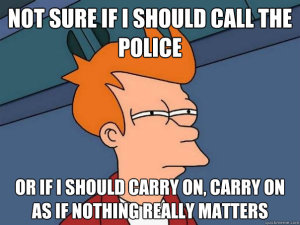-
Jesus was Marginalized
 Jesus was marginalized for hanging out with the poor,
Jesus was marginalized for hanging out with the poor,the gangbanging zealot and despicable whore.
He went to dark places, the ghetto and hood.
He didn’t need affirmation, he knew where he stood.
The peace seeds he sowed were ridiculously small,
like mustard seeds when planted, invisible to all.
But germinate they did and grow to this day,
proving redemption through relationships is the best way.
I’ve joined him in the work that leads not to fame,
if I endure to the end I’ll be glad that I came,
to enter dark places with the torch of the Spirit.
If I first live out the Gospel, I’ll have the right to proclaim it.
The homeboys who trust me might invite me to toke
(I hope I don’t get buzzed on the second hand smoke),
but I graciously decline and explain as I say,
“Thanks dude, but I’ve found a better way.”
This is so not the life I had planned,
back in my Humboldt hippie days, eco-groovy and grand.
Waging the war to preserve ancient forest,
in hope that such beauty endure untarnished.
But I’m in a transition I can’t figure out.
I look back on my life and ask, “What’s this about?”
I still dig the forest, but my values have shifted.
My contempt for the city is now being lifted.
Like Jonah I tried to run from my calling,
afraid of the slums and actually falling
in love with the broken God so passionately cherished,
refusing to care whether or not they perished.
So now I’ve repented, to the inner-city I’ve turned.
Since entering its gates, this is what I have learned.
There is actually beauty here, ‘though sublime and misunderstood.
I’m finding hidden treasure waging peace in the hood.
-Harlan Young, 2011
-
A Letter and a Postscript
To Whom It May Concern:
Tim and Sam are people who have struggled to improve their lives. And they have succeeded.
Tim struggled through his addiction with drugs and homelessness. In the midst of his lowest points, he was in jail and he failed in treatment programs. In the midst of this, he remained cheerful and encouraging to his friends, but that doesn’t mean that internally he wasn’t fighting with the two parts of himself—addiction and self-control.
Tim has now been living in my house for over a year and he’s been clean and sober for almost two. He has had a full time job working for a printer for nine months. And this change is due to many reasons, but the two most important is his deep and abiding love for Jesus and his deep and abiding love for Sam and their daughter, Paloma.
Sam struggled with severe depression and a resulting addiction to alcohol. She lost her husband, her four children, and her apartment. She and Tim met each other in the midst of this time, introduced by a homeless friend, and they fell in love. They became homeless together for a short period of time, and Sam discovered that she was pregnant with Tim’s child.
Sam moved in with friends, and as the baby’s birth drew close, moved into my house. She is fully supported by Tim and she supports Tim. And now that Paloma is with them, no hardship, no difficulty, nothing will cause them to go back to addiction. Sam now has contacts and visits with her other children regularly, and she cares for her new baby. She works part time for Anawim Christian Community, a church supporting the homeless community in East Multnomah County.
Why am I writing this? Because I am hoping that you will give them a chance. Yes, they have made some mistakes—perhaps a lot of mistakes—but that doesn’t change the fact that you will not meet a more compassionate, faithful couple than this one. They need a chance and they deserve one. Please be the person that gives them that chance to start a new life together.
Steve Kimes
Pastor of Anawim Christian Community Post Script:
Post Script:
I wrote that letter six years ago. Tim is still working for the printer. They now have another child together, Elijah, who was a drummer as soon as he had some control over his arms. Paloma and Elijah are beautiful, happy, energetic kids. After they moved out of my place, they moved into a one-bedroom tiny home.
They stayed in that home for a year and then they moved into a three bedroom apartment, where they are now. Sam’s daughters, April and Eryn moved in with them. April eventually moved out and got married. Sam and Tim sport dreads now, and go to cool hippie concerts. They have way surpassed me in coolness.
In the end, if a community supports a homeless family, both the community and the family wins. It doesn’t mean everything will be perfect. I didn’t mention a lot of issues and problems along the way. It is support and love that makes life thrive.
God bless you guys. With all my love, Steve
-
Fewer People on the Street!
 Every other year, main metropolitan areas do a “Point in Time” count of the homeless. It always occurs near the end of January, and the idea is to physically count folks on the street, so the government knows how much to spend, to find out if certain strategies are working.
Every other year, main metropolitan areas do a “Point in Time” count of the homeless. It always occurs near the end of January, and the idea is to physically count folks on the street, so the government knows how much to spend, to find out if certain strategies are working.A month ago, the Department of Housing and Urban Development released a report saying that homelessness has gone down 31 percent since 2007. That’s quite a decrease! Perhaps we are solving the issues!
Before we take time to celebrate, let’s look at some facts. First of all, in 2007, there was a jump in homelessness because of the mortgage crisis, so perhaps those numbers were chosen to make the decrease seem more dramatic.
These numbers also don’t count the total homeless. They only count those who are currently living without any kind of shelter. So those in transitional houses, those staying with friends, those in motels, those in temporary shelters aren’t being counted. In fact, the number of folks in shelters and transitional homes have increased. And more people have moved into permanent low income homes than ever before. So the numbers might very well reflect this.
Also, while we are seeing a dramatic decrease of homelessness in small cities and rural areas, the large cities such as New York, Washington DC and Portland are seeing increases of homelessness. So while California as a whole has reduced their homeless issues, cities with housing prices increasing also have homelessness increasing. For instance, San Francisco has increased their homeless numbers by 22 percent.
This year’s count numbers are still to come in, so the final word isn’t out, but those of us in larger urban settings have a lot more work to do.
Source: Quartz
-
Should the Police be Involved?
 When we are working with homeless folks, there are times when there are… problems. Perhaps you will see someone using drugs in the bathroom, perhaps a fight will break out, perhaps someone will be drinking on the property. Some facilities will immediately call the police to deal with the situation. Generally, the folks who have been around longer will pick their fights. But which situations do we really need the police for?
When we are working with homeless folks, there are times when there are… problems. Perhaps you will see someone using drugs in the bathroom, perhaps a fight will break out, perhaps someone will be drinking on the property. Some facilities will immediately call the police to deal with the situation. Generally, the folks who have been around longer will pick their fights. But which situations do we really need the police for?First of all, always try to deal with a situation yourself. If you know someone is using drugs on the property, ask them to leave. If someone is drinking on the property, take the alcohol away. Give a warning, or set up a penalty.
In general, we don’t want to call the police. First, because the police should have other things to do, other emergencies to handle. We don’t want to be seen as a facility that NEEDS the police hanging around. That ruins the reputation of our facility. Also, if the police are called, they might think it is an emergency and deal with the issue stronger than is necessary. And if we call the police in situations other than a dire emergency, we might lose our reputation among the houseless community.
So when DO we call the police? First, if a violent situation is out of our control. If a fight breaks out, we might be able to break it up. But if violence is out of our control, or if the leaders are the target of violence, it is time to call the police.
I might also call the police if someone is banned from the facility or it is time to close, but they refuse to leave. They might need an extra nudge to get them off the property. In these cases, we might want to inform the officers that we are not looking to press charges, but only to have them taken off the property. The police will check for warrants, but not make an arrest otherwise.
When calling the police, I highly recommend using the non-emergency line. If we call 911, the police are prepared for the worst situation, hands on guns, because they don’t know what they are getting into. But if we call the non-emergency line, we can explain better what the situation is, and the police won’t rush, and they’ll be calmer and ready to deal with a non-emergency situation. Every police department has a non-emergency number, so I recommend finding out what it is, and put it on your phone.
In general, though, calling the police should be the last resort.
-
A Super Bowl Long Ago…
 Jeff Strong (aka “Faithwalker”) used to live on the RedBarn property, providing security. Sometimes church security is… interesting: Jeff re-tells a story from four years ago:
Jeff Strong (aka “Faithwalker”) used to live on the RedBarn property, providing security. Sometimes church security is… interesting: Jeff re-tells a story from four years ago:
How stupid can you be about a super bowl?
Today I went out to check on my motor home and just as I am approaching the drive way there are two guys slugging it out on the churches property. So I stopped and broke it up. They were both bleeding pretty good and when I asked what they were fighting about they said the Super Bowl and who was going to win…….
Ready for this? one is a Ducks fan and the other is a Beaver Fan. So you can imagine their dismay when I told them that the college teams didn’t play in the Rose Bowl.
Yes alcohol was involved and no they are not homeless folks….
Homeless folks are smarter than that even if they are drunk they are smarter than that.
3733 N Williams Ave
Portland, OR 97227
503.888.4453
AnawimCC@gmail.com
Ministry Locations and Times »











